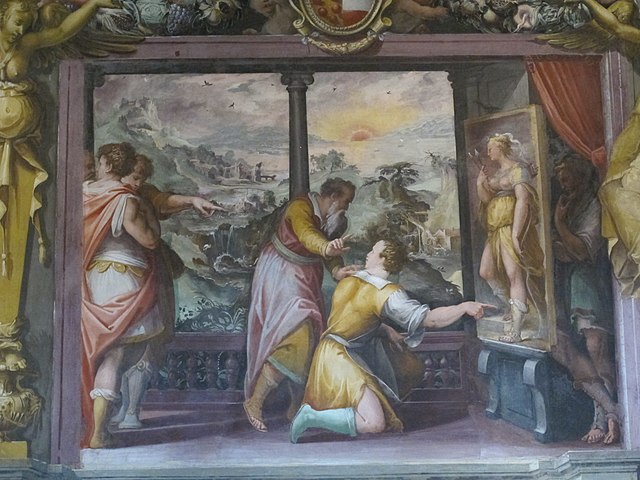Loading AI tools
Warning to avoid passing judgement beyond one's expertise From Wikipedia, the free encyclopedia
Ne supra crepidam ("not beyond the shoe") is a Latin expression used to tell others not to pass judgment beyond their expertise.

The phrase is recorded in Book 35 of Pliny the Elder's Natural History as ne supra crepidam sutor iudicaret[1] ("Let the cobbler not judge beyond the crepida") and ascribed to the Greek painter Apelles of Kos. Supposedly, Apelles would put new paintings on public display and hide behind them to hear and act on their reception.[2] On one occasion, a shoemaker (Latin sutor) noted that one of the crepides[a] in a painting had the wrong number of straps and was so delighted when he found the error corrected the next day that he started in on criticizing the legs.[2] Indignant, Apelles came from his hiding place and admonished him to confine his opinions to the shoes.[2] Pliny then states that since that time it had become proverbial.[2]
The expression became current again during the Renaissance, which featured intense interest in both painting and Classical Antiquity.[3] Erasmus's Adages included the form ne sutor ultra crepidam.[4] Richard Taverner translated this into English as "Let not the shoemaker go beyond hys shoe", which became "Cobler keepe your last" in the 1616 revised edition of John Withals's Shorte Dictionarie for Yonge Beginners and ultimately cobbler, keep to your last.[4] The same idea is also proverbial in Danish (Skomager, bliv ved din læst), Dutch (Schoenmaker, blijf bij je leest), German (Schuster, bleib bei deinen Leisten), and Polish (Pilnuj, szewcze, kopyta) and—slightly modified— in Russian (Суди, дружок, не свыше сапога, "Judge not, pal, above the boot"), after Alexander Pushkin's poetic retelling of the legend,[5] and in Spanish (Zapatero, a tus zapatos, "Shoemaker, to your shoes") and in Slovene (Le čevlje sodi naj kopitar, "let the cobbler judge the shoes only"), from France Prešeren's poem depicting the story.[6]
Karl Marx ridiculed the idea: "'Ne sutor ultra crepidam' – this nec plus ultra of handicraft wisdom became sheer nonsense, from the moment the watchmaker Watt invented the steam-engine, the barber Arkwright the throstle, and the working-jeweller Fulton the steamship."[7]
An ultracrepidarian—from ultra- ("beyond") and crepidarian ("things related to shoes")—is a person considered to have ignored this advice and to be offering opinions they know nothing about. It is first attested in the English essayist William Hazlitt's 1819 open "Letter to William Gifford", the editor of the Quarterly Review: "You have been well called an Ultra-Crepidarian critic."[8] The editor of Hazlitt's writings, however, offers that it might have been coined by Charles Lamb instead.[8] It was picked up four years later in Hazlitt's friend Leigh Hunt's 1823 satire Ultra-Crepidarius: A Satire on William Gifford. Occasionally the word ultracrepidarianism—the act or general practice of speaking beyond one's knowledge—was used similarly later.[9]
Seamless Wikipedia browsing. On steroids.
Every time you click a link to Wikipedia, Wiktionary or Wikiquote in your browser's search results, it will show the modern Wikiwand interface.
Wikiwand extension is a five stars, simple, with minimum permission required to keep your browsing private, safe and transparent.